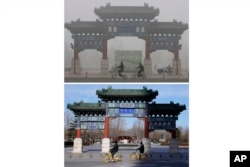Olympians and others arriving in China for the Beijing Games were welcomed with blue skies and clear views of the city.
The clean air marks a big change from just 10 years ago, when the city’s pollution often made it difficult to see nearby buildings. At the current Winter Games, the air has been clean enough for people to see the mountains and surrounding city.
So, how has China improved its air quality after years of serious pollution problems?
What changed?
In 2013, pollution hit record levels in Beijing. This led to increased international attention and criticism of how the country was dealing with the problem. China reacted by launching an aggressive plan to improve its air quality.
Officials promised to fight pollution “with an iron fist," said a recent report from the Energy Policy Institute at the University of Chicago. China’s plans were announced around the same time the country started its campaign to get the 2022 Winter Games.
The country ordered stronger emissions rules for coal-fired power centers and limited the number of cars on the road.
The report notes that China had also aimed to clear its skies for the 2008 Summer Games in Beijing. But for the 2022 Games, similar measures were carried out on a much larger scale, it said.
Local officials were given environmental targets, and coal-fired burners in homes were replaced with gas or electric heaters. The government’s reporting of air quality data also improved.
Is Beijing’s air clean now?
Even though there has been progress, Beijing's yearly average air pollution in 2021 was still more than six times the limit established by the World Health Organization's guidelines.
Because Beijing is surrounded by coal-burning industries, it still experiences bad air days, said Lauri Myllyvirta. She is with the Center for Research on Energy and Clean Air in Helsinki, Finland. Myllyvirta was living in Beijing until 2019. She said the severity of such bad days depends on things like how many cars are on the road or how much wind there is to blow away polluted air.
Chinese officials have praised the country's progress. They say that last year, there were 288 days of good air quality in Beijing, compared to 176 days in 2013.
How is health affected?
The effects of air pollution can be felt in different ways, such as irritated eyes and difficulty breathing.
“You could hear people coughing all over because of it,” Myllyvirta said about the dirty air.
Children, older adults and people with existing health issues, including the breathing condition asthma, are more likely to feel the effects of pollution. Particles found in air pollution can get deep into people’s lungs. This has been linked to health problems including uneven heartbeat and reduced lung performance.
Poorer people are also more affected if they cannot buy air purifiers or must work outdoors, said Guojun He. He is a researcher at the University of Hong Kong and co-writer of the report from the Energy Policy Institute.
What is next?
China says it will become carbon neutral by 2060. Although China still depends heavily on coal for electricity, He said the country has made major progress in limiting emissions. China is also quickly developing clean energy from sources like wind and sun.
“When it’s possible, I think in general, the transition is going to be happening and it’s actually happening right now,” He said.
In the meantime, he noted that the government can take short-term measures, such as temporarily shutting down factories. That could help ensure clearer skies for big political or social events, like the Olympics.
I’m Bryan Lynn.
The Associated Press reported this story. Bryan Lynn adapted it for VOA Learning English.
_____________________________________________________
Words in This Story
view – n. what can be seen from a particular place
(rule) with an iron fist – phr. to control a group of people very strongly and having complete power over everything they do
emission – n. the act of producing or sending out something (such as energy or gas) from a source
scale – n. a distinctive relative size, extent, or degree
irritate – v. to make a part of the body sore or painful
cough – n. to force air out of your lungs through your throat with a short, loud sound
transition – n. a change from one form or kind to another






